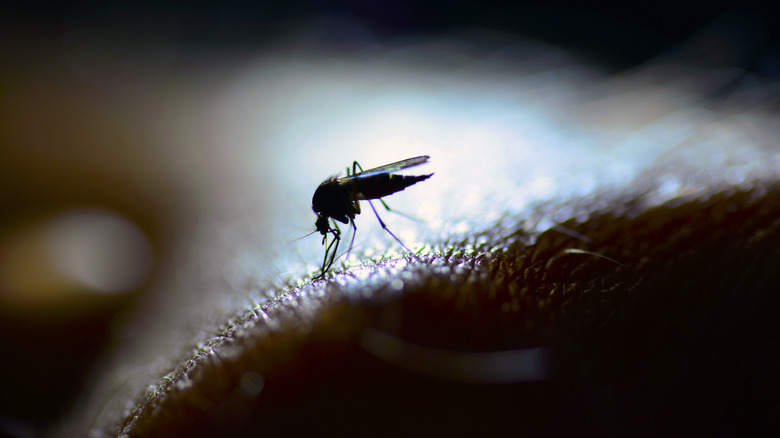Help Keep Insects Far Away From Your Campsite With This Pantry Staple
The familiar, high-pitched whine of a mosquito in your ear can be an annoying reminder of the less relaxing side of nature that we expose ourselves to when we go camping. Everyone knows a can of bug spray can help to keep you safe from insect bites, but because the chemical DEET can cause some skin irritation, feel oily, and smell bad, people are often on the hunt for a good alternative. There are many hacks to keep bugs away from your campsite, and according to numerous articles, message boards, and popular videos, an ingredient you probably already have in your kitchen might be a good solution: Vanilla. But is it true? Can vanilla really keep bugs away?
As pleasant as it would be to smell like a sugar cookie instead of DEET, vanilla is not a good substitute for traditional bug spray, especially if you're about to be sleeping outdoors in a location where mosquitoes carry dangerous diseases like Zika, Dengue, West Nile, and Malaria. It might not be the first thing that springs to mind when planning your dream vacation to a tropical paradise in the Caribbean, but you should always check to see what vaccinations are required for mosquito-borne illnesses in your destination. You should also carry a bug spray with a repellent that is proven to keep mosquitoes away, like DEET or Picaridin. Don't count vanilla out completely, though. When used the right way, it can be a fantastic asset in your fight against mosquitoes.
Vanilla is not a repellent – but it is useful
While there is plenty of anecdotal evidence that vanilla works to keep mosquitoes away from you, and some experts have theorized that a strong smell like vanilla may be able to disguise the natural body scents that attract the bugs to bite you, scientific studies don't support that idea. As reported by the Wisconsin Mosquitoes and Mosquito-Borne Diseases, there's no evidence that vanilla alone does anything to repel mosquitoes. However – it might be able to make other repellents last longer.
Vanillin is the component of vanilla that makes it smell (and taste!) like the popular flavor. By itself, vanillin doesn't repel mosquitoes. However, for decades, scientists have known that vanillin can also be used to make other mosquito repellents last longer and work better. One 1975 study published in Mosquito News found that combining vanillin and DEET in equal amounts created a repellent that lasted a staggering 95% longer than just DEET on its own. The amount of time the DEET stayed effective increased the more vanillin was added. In 2001, a study published by the Journal of Vector Ecology found that even less effective repellents were more powerful when combined with vanillin.
How to use vanillin to keep mosquitoes away
While the popular internet hack suggests that all you have to do to keep mosquitoes away is put some vanilla extract into a spray bottle and apply it to your exposed skin, actually using vanillin to protect you can be a little more complicated. If you truly want a DIY bug spray, pure vanillin is available and fairly inexpensive. If you want to unleash your inner chemist and mix it with DEET, the results will likely be a more powerful, longer-lasting bug spray. However, the easiest way to use this information is likely to choose a more effective bug spray that is already made.
While vanillin can make less effective bug sprays more potent, the best-studied and proven bug repellent is DEET. However, if DEET irritates your skin, picaridin can be a great alternative. While it hasn't been in use as long (thus, there are fewer years of research behind it), picaridin has been found to be highly effective. Fortunately, there are numerous products currently on the market that combine picaridin and vanillin to create a powerful bug-repellent.


